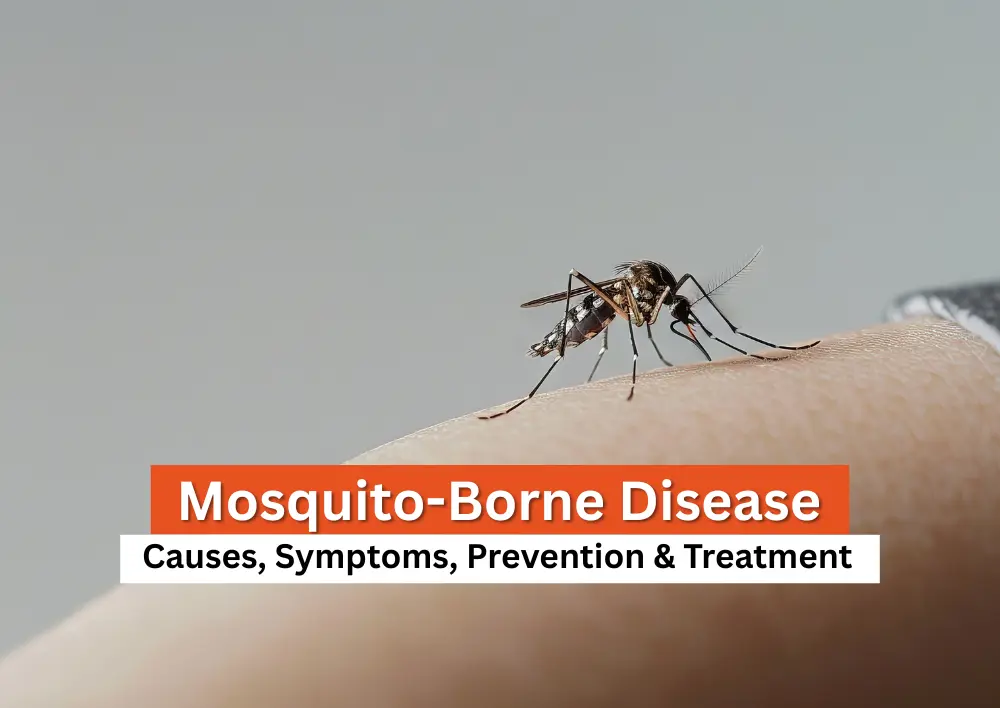Mosquito-Borne Disease: Causes, Symptoms, Prevention & Treatment
Mosquito-borne diseases, such as dengue, malaria, chikungunya, Zika, and yellow fever, are a major health concern, especially during the rainy season. These diseases are transmitted through mosquito bites, leading to serious complications if not treated. Symptoms like fever, joint pain, rash, and fatigue require immediate medical attention. Preventive measures, including using mosquito repellent, eliminating stagnant water, and vaccination, are essential to reduce the risk of infection.
Mosquitoes are small insects that are responsible for spreading some of the world’s most dangerous diseases. From fever to life-threatening conditions, mosquito-borne diseases are a major health concern, especially during the rainy season. In this blog post, the leading internal medicine doctor in Gurgaon provides insight into mosquito-borne disease, its types, symptoms, how to protect yourself, and when to seek medical help.
What Are Mosquito-Borne Diseases?
Mosquito-borne diseases are illnesses that occur when a person is bitten by a mosquito carrying harmful viruses or parasites. These infections are especially widespread in tropical and subtropical areas, where mosquito populations thrive due to warm climates and inadequate sanitation.
What are the Diseases Caused by Mosquitoes?
Mosquitoes are responsible for spreading several serious diseases. Here are some common mosquito-borne diseases:
1. Dengue:
Dengue is one of the most serious diseases and a very common disease, which is spread by mosquitoes. This is passed on through the bite of an Aedes aegypti mosquito, which usually bites during the daytime. Dengue symptoms usually begin 4 to 10 days after being bitten by an infected mosquito. Common symptoms are high fever, strong headache, pain behind the eyes, skin rash, body and joint pain and tiredness. In some cases, it can turn into dengue hemorrhagic fever, which causes bleeding and a drop in platelet levels. If left treated on time, it can become life-threatening.
2. Malaria:
This disease is caused by a parasite called Plasmodium and is spread by the female Anopheles mosquito, which usually bites at night. The common malaria symptoms include fever, chills, sweating, headache, nausea, and pain in the body. These symptoms usually appear in cycles. Malaria can become very serious if not treated early, especially infections caused by Plasmodium falciparum, which can lead to organ failure and death. Antimalarial medications are available and effective if taken properly.
3. Chikungunya:
This mosquito-borne illness is mainly spread by Aedes aegypti and Aedes albopictus mosquitoes. It usually begins with a sudden high fever, followed by intense joint pain, commonly in the hands, feet, knees, and lower back. The joint pain can be quite strong and may continue for weeks or even months. Other symptoms may include tiredness, headache, muscle aches, and skin rashes. Because of the long-lasting joint pain, it can make everyday tasks harder and affect a person’s normal routine.
4. Zika Virus:
Zika virus is spread through the bite of Aedes mosquitoes and can lead to mild symptoms such as a slight fever, skin rash, red eyes, body pain, and discomfort. Most people get better in a few days without any major problems. However, Zika becomes a serious issue during pregnancy. If a pregnant woman gets infected, it can lead to birth defects like microcephaly, a condition where the baby’s head is smaller than usual, which can affect brain growth and development.
5. Japanese Encephalitis:
Japanese Encephalitis is a severe brain infection which is caused by a virus and spread via the bite of Culex mosquitoes. These mosquitoes are usually found in farming areas, especially near rice fields and animals. Most people who get infected don’t show any signs, but in severe cases, it can cause high fever, vomiting, seizures, confusion, and brain swelling. It can sometimes lead to permanent brain damage or even be fatal. A vaccine is available and is advised for people living in or traveling to high-risk regions.
6. Yellow Fever:
Yellow fever is a common viral infection passed on via the bite of Aedes and Haemagogus mosquitoes. It gets its name from the yellowing of the skin and eyes (jaundice) that can happen in serious cases. Early signs include fever, body pain, headache, feeling sick, and vomiting. In some people, the illness can become more severe, leading to bleeding, liver damage, and even death. It can be prevented with the help of a vaccine, which offers long-lasting protection.
What are the symptoms of mosquito-borne disease?
Mosquito-borne diseases usually start with symptoms that feel like the flu, but they can quickly become more serious if not treated properly.
-
High Fever: Most mosquito-borne diseases start with a sudden high fever.
-
Headache: A constant or severe headache is a frequent symptom, especially in dengue and malaria.
-
Muscle and Joint Pain: Severe muscle pains and joint pain are common in chikungunya and dengue, usually making movement painful.
-
Skin Rash: Viral infections like dengue, Zika, and chikungunya often cause rashes that appear a few days after the fever starts.
-
Chills and Sweating: Typical of malaria, patients may experience repeated cycles of chills followed by sweating.
-
Nausea and Vomiting: These digestive symptoms can occur in diseases like malaria, dengue, and yellow fever.
-
Fatigue and Weakness: Most mosquito-borne illnesses leave patients feeling extremely tired and weak, even after the fever goes away.
-
Pain Behind the Eyes: Commonly seen in dengue, this type of pain adds to the discomfort during infection.
-
Seizures or Confusion (in severe cases): Diseases like Japanese encephalitis can cause brain inflammation, leading to confusion, seizures, or loss of consciousness.
-
Jaundice (Yellowing of Skin/Eyes): Seen in yellow fever, jaundice indicates liver involvement and requires urgent care.
-
Bleeding: In some serious cases of dengue, there is some risk of symptoms like nosebleeds, gum bleeding, or any internal bleeding.
How are Mosquito-borne Diseases Treated?
Treating mosquito-borne diseases depends on the type of illness and how serious the symptoms are. Most of these diseases do not have a specific cure, but timely medical care can help manage symptoms and prevent complications.
-
Dengue has no direct medicine to kill the virus. The treatment mainly focuses on rest, drinking plenty of fluids, and taking medicines like paracetamol to reduce fever and body pain. In severe cases, such as dengue hemorrhagic fever, hospital care may be needed to monitor platelets and provide IV fluids.
-
Malaria can be treated with specific medicines called antimalarials. The doctor recommends the medicines depending on the type of malaria. Early treatment is important to prevent serious complications like kidney failure or brain damage. With proper medicine and care, most people recover fully.
-
Chikungunya also doesn’t have a specific cure. The treatment of Chikungunya focuses on symptoms, such as joint pain and fever. Patients are advised to take plenty of rest, stay hydrated, and use pain relievers like paracetamol. In some cases, joint pain may last for weeks or even months, and physiotherapy can help ease the discomfort.
-
For the Zika virus, treatment is mostly supportive. That means getting plenty of rest, drinking fluids, and taking medicine for fever or pain. Pregnant women should be especially cautious, as Zika can cause birth defects. If there is a risk of exposure, consult a doctor immediately.
-
Japanese Encephalitis and Yellow Fever are more serious mosquito-borne illnesses. These can affect the brain and liver, so patients may require hospitalization. Treatment involves managing symptoms with IV fluids, oxygen, and close monitoring. Vaccines are also available for both diseases to prevent them.
If you or your loved ones experience symptoms like fever, rash, joint pain, or fatigue, don’t ignore it. Consult a trusted general physician in your area. Quick and timely treatment can prevent complications and even save lives.
How to Avoid Mosquito-Borne Diseases?
Mosquito-borne disease prevention starts with protecting yourself from mosquito bites. Here are some simple and effective ways to avoid mosquito-borne diseases:
-
Use mosquito repellent on exposed skin.
-
Sleep under mosquito nets.
-
Keep doors and windows closed or use fine mesh screens to prevent mosquitoes from entering the house.
-
Wear full-sleeved clothes and long pants to reduce exposure.
-
Avoid water stagnation in coolers, pots, buckets, plant trays, and tyres are common mosquito breeding spots.
-
Clean water tanks and containers regularly.
-
Use mosquito coils, vaporizers, or plug-in repellents in rooms.
-
Trim bushes and keep surroundings clean to reduce hidden spots.
-
Get vaccinated for diseases like Japanese Encephalitis and Yellow Fever if you are in or traveling to high-risk areas.
-
Stay informed about local outbreaks.
-
Take extra precautions during the breeding as well as the rainy season.
-
Protect infants and the elderly as they are more vulnerable to mosquito-borne infections.
-
Consult immediately if you notice symptoms like high fever, rashes, or joint pain after a mosquito bite.
Conclusion:
Mosquito-borne diseases may start with common symptoms like fever or fatigue, but they can quickly turn serious if not recognized and treated in time. With illnesses like dengue, malaria, chikungunya, Zika, Japanese encephalitis, and yellow fever posing real threats, especially during the rainy season, it is important to stay alert and take preventive steps. Simple habits like using mosquito repellents, wearing protective clothing, eliminating stagnant water, and staying informed about outbreaks can go a long way in keeping you and your loved ones safe.
If you experience any symptoms after a mosquito bite such as high fever, rashes, joint pain, or persistent weakness, don’t delay. Find an internal medicine doctor near you immediately for diagnosis and treatment.
Frequently Asked Questions
The Aedes aegypti mosquito is responsible for spreading dengue.
Anopheles mosquito bite causes malaria.
All mosquito species carrying diseases are dangerous, especially Aedes, Anopheles, and Culex.
Mosquitoes spread diseases by injecting infected saliva into the bloodstream while biting.
-
Aedes: Dengue, Zika, Chikungunya
-
Anopheles: Malaria
-
Culex: Japanese Encephalitis, West Nile virus
Dengue, malaria, chikungunya, Zika virus, Japanese encephalitis are caused by mosquito bites.
















Was the information useful?
1 0